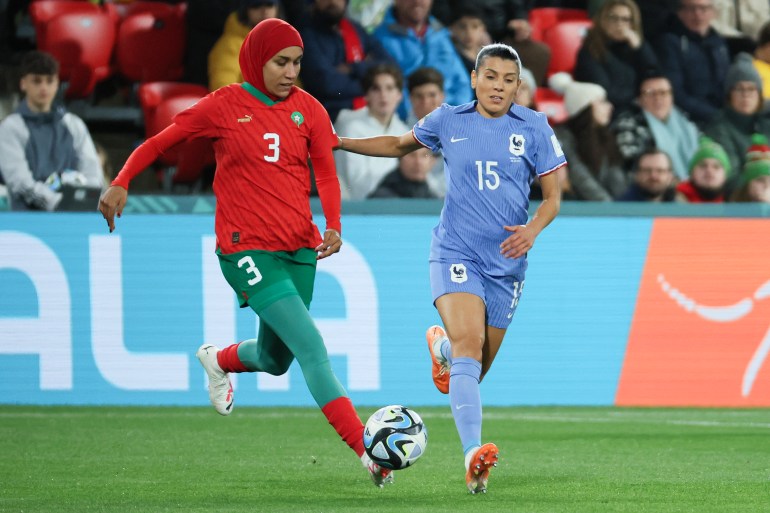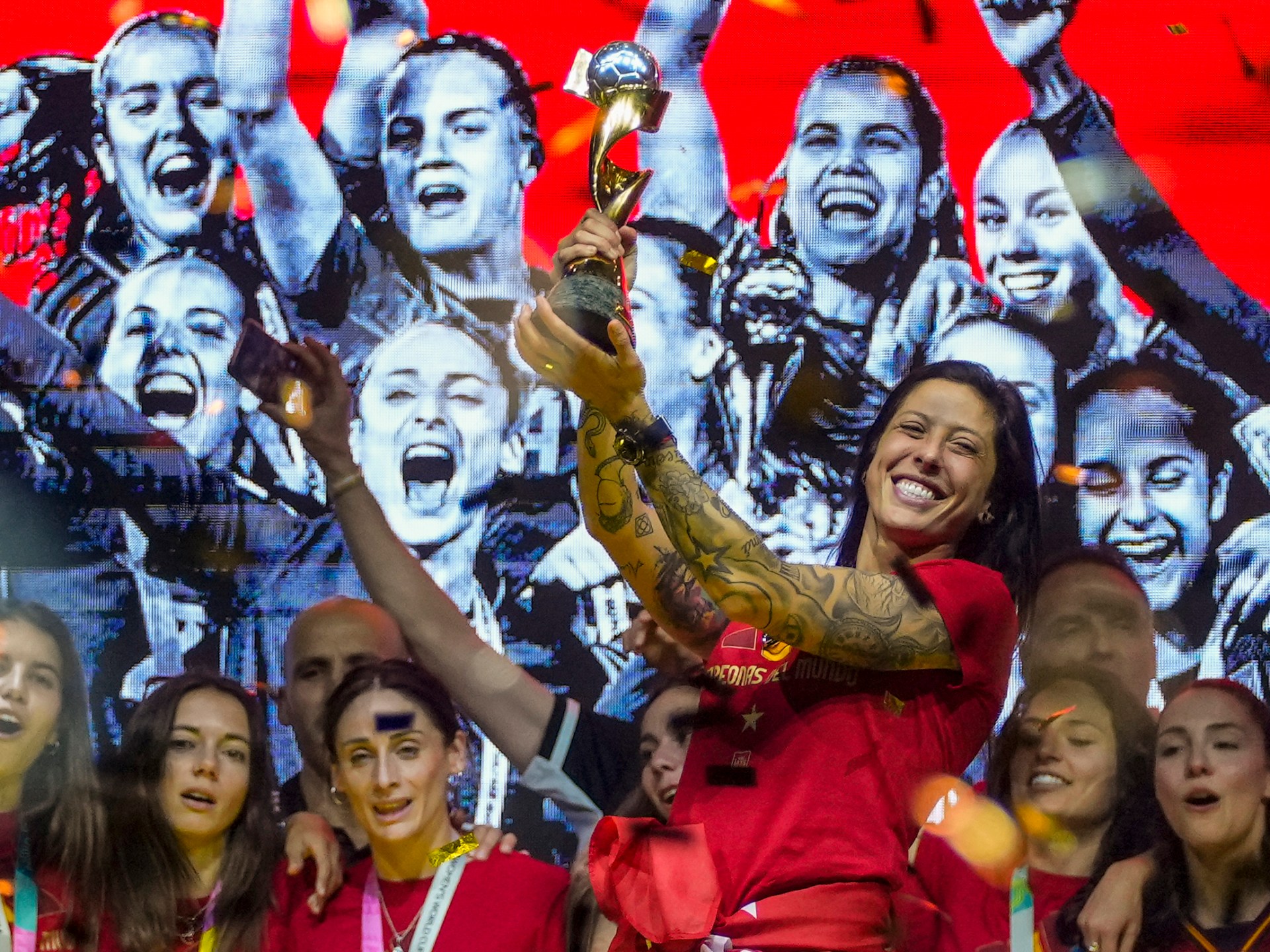It was the year that saw Australia and New Zealand host the biggest and most-watched FIFA Women’s World Cup, which culminated with Spain’s crowning moment as first-time champions with a win over one of the pre-tournament favourites England.
Women’s football giants United States faltered at the quarterfinal stage and several minnow nations lit up the group stage.
The World Cup was packed with high-quality action, as well as shocks and feel-good stories and culminated with the launch of Spanish football’s #MeToo movement.
Elsewhere, US Soccer delegated Emma Hayes with the job of reviving their fading glory as the highest paid women’s football coach in the world.
As the year comes to a close, here’s a look at 10 moments that shaped women’s football in 2023:
‘Ever-growing ACL club’
Months ahead of the World Cup, England captain Leah Williamson, New Zealand striker Katie Rood and several other top players were left to rue their luck after being sidelined with ACL injuries.
Rood announced the news with a post on Instagram saying, “I’m sad to say that I’ve joined the ever-growing ACL club”.
In order to understand the widespread prevalance of the injury among women footballers, Al Jazeera spoke to a wide range of experts and players, who pointed at a number of factors, including the biological differences between men and women, the difference in their kits and boots, physical stress and workload. Researchers also underlined how women’s menstrual cycles could be a factor in their vulnerability to the injury.
Player revolt precedes Spain’s historic win
Nearly a year before Spain’s glorious run at the World Cup, the Spanish football federation (RFEF) and its players were embroiled in a months-long stand-off.
The “Las 15” – a group of 15 players demanded changes to the national team set-up and made themselves unavailable for selection, directing the majority of their complaints at coach Jorge Vilda. They sought improvements in working conditions, blaming them for their poor emotional and physical health.
Later, the players entered talks with the federation and three of them, including Ballon d’Or winner Aitana Bonmati, were included in Spain’s World Cup squad that landed the La Roja their first world title.
The player revolt continued after the World Cup in the wake of the scandal surrounding Luis Rubiales’s forced kiss on player Jenni Hermoso’s mouth. However, the squad agreed to end their boycott in October after Rubiales was banned for three years by FIFA and the Spanish federation promised to make “immediate and profound changes.”
When Hannah Dingley took over as the head coach of English League Two club Forest Green Rovers, albeit temporarily, she became the first woman to manage a professional men’s football team in England.
Dingley stayed at the position for two weeks but was credited for breaking the glass ceiling for young girls taking up managerial roles in men’s football.
Previously, Portuguese coach Helena Costa became first woman to coach a men’s football team in France when, in 2014, she took charge of then-league two French club Clermont Foot.
Several women have taken up coaching roles in men’s academy teams, but not many have been handed the reins of top-flight men’s teams.
We can confirm that Hannah Dingley has been named our Caretaker Head Coach.
Dingley will take charge of the team for tomorrow night’s friendly at Melksham Town.#WeAreFGR💚
— Forest Green Rovers (@FGRFC_Official) July 4, 2023
Morocco shine at historic first World Cup
Football fans and experts may have believed that Morocco had done their bit by becoming the first Arab team to qualify for the Women’s World Cup, but the Atlas Lionesses were out to prove them wrong.
“It’s amazing to keep creating history,” star striker Rosella Ayane told Al Jazeera after her team made it to the round of 16 at the tournament.
Back home, from Fez to Marrakech and beyond, fans gathered in cafes, homes and on the streets to get behind the women in red and green as they took on their former coloniser France in the knockout round.
Despite their disappointing loss at the hands of the French, the rise of the Atlas Lionesses, several of whom play league football in Europe, endeared them to the football-mad African nation.
المستحيل ليس مغربيا 🇲🇦🤯
𝐑𝐨𝐚𝐫𝐢𝐧𝐠 𝐰𝐢𝐭𝐡 𝐩𝐫𝐢𝐝𝐞 𝐟𝐨𝐫 𝐨𝐮𝐫 𝐋𝐢𝐨𝐧𝐞𝐬𝐬𝐞𝐬#DimaMaghrib #OneGameOneFamily #AtlasLionesses pic.twitter.com/TEpTEyESh3
— Équipe du Maroc (@EnMaroc) August 3, 2023
Hijab-clad Nouhaila Benzina breaks barriers
Morocco had plenty to say at the tournament Down Under as Nouhaila Benzina became the first Muslim woman wearing a hijab to play at the World Cup.
Football fans, especially Muslim women, lauded Benzina for breaking the barrier. Millions around the world watched as she stepped on the field in the hijab a month after France banned the Islamic headscarf during games.
Activist Shaista Aziz was among the scores of Muslim women who backed Benzina on social media.
“The significance of this is HUGE for many #Muslim girls and women including myself,” Aziz wrote on X.

The USWNT juggernaut comes to a halt
Most of the pre-tournament predictions and talks were centred at the US Women’s National Team’s prospects of completing a “three-peat” or an unprecedented third consecutive and fifth overall world title.
The women’s football giants began their campaign with a 3-0 thrashing of minnows Vietnam, but cracks began to show as they struggled against a strong Dutch side in their second group-stage match, which ended in a 1-1 draw. Needing to avoid a loss to stay in the tournament, they earned a goalless draw against Portugal.
However, the juggernaut came to a halt on August 6 as Sweden knocked out the holders in a madcap penalty shootout (5-4). The talismanic retiring great Megan Rapinoe came off the bench to replace forward Alex Morgan in extra time but was unable to create a winner for the Americans who slumped to their quickest exit.
Debutants and minnows shine
The Philippines and Zambia made impactful World Cup debuts, recording stunning wins over New Zealand and Costa Rica. The Philippines’ win over the co-hosts, in particular, made waves back home as delirous crowds celebrated the shock win.
Playing in their second World Cup, Jamaica and South Africa were the other surprise packages as they advanced to the knockout stage.
In what was arguably the biggest moment in women’s football – and women’s sport – in the year 2023, FIFA bannd the powerful Spanish Football Federation (RFEF) President Luis Rubiales from the sport for three years for misconduct at the Women’s World Cup final where he forcibly kissed Spain’s Jenni Hermoso on the lips at the trophy ceremony.
FIFA’s ban came more than two months after the disgraceful moment was televised across the world as Spain stepped on the stage to collect their winners’ medals and trophy. Hermoso reacted to the forced kiss in a social video, where she said: “Hey, I didn’t like it, eh.”
She would later file a legal complaint against Rubiales, who initially refused to step down from his post and threatened the player with legal action of his own. However, the moment and the ensuing proceedings launched Spanish football’s #MeToo movement as thousands of women took to the streets in Spain to show support Hermoso. Women’s football teams, fans and men’s national team also condemned Rubiales.
The term #SeAcabo [it’s over] became synonymous with the movement as leading football players used it to show their solidarity.
Emma Hayes’s landmark move to the US
The USWNT’s poor run at the World Cup raised several questions about the future of the team and its management. Several players, including Rapinoe and midfielder Julie Ertz retired from international footbal
Coach Vlatko Andonovski resigned in the immediate aftermath of the tournament ouster, leaving fans and experts to wonder who would take up one of the most high-profile coaching jobs in the sport.
Last month, Chelsea manager Emma Hayes was named as Andonovski’s replacement in a move that would be touted as “a breath of fresh air” and a landmark moment for the women’s game as she will become the highest-paid women’s football coach in the world, reportedly earning $2m a year – the same as the US men’s national team coach Gregg Berhalter.
Full circle, back to the States. 🇺🇸
More on Emma Hayes’ career 👇
— U.S. Women’s National Soccer Team (@USWNT) November 15, 2023
Women’s football in England took a big step towards after its top two leagues – the Women’s Super League and Women’s Championship – decided to break away from the Football Association under the banner of NewCo – a newly formed organisation to run the women’s professional game in the country.
The change will come into effect from the 2024-25 season but the news has set women’s football abuzz in England, with former FA director of women’s game saying it had now found “its own voice”.
Check out our Latest News and Follow us at Facebook
Original Source

